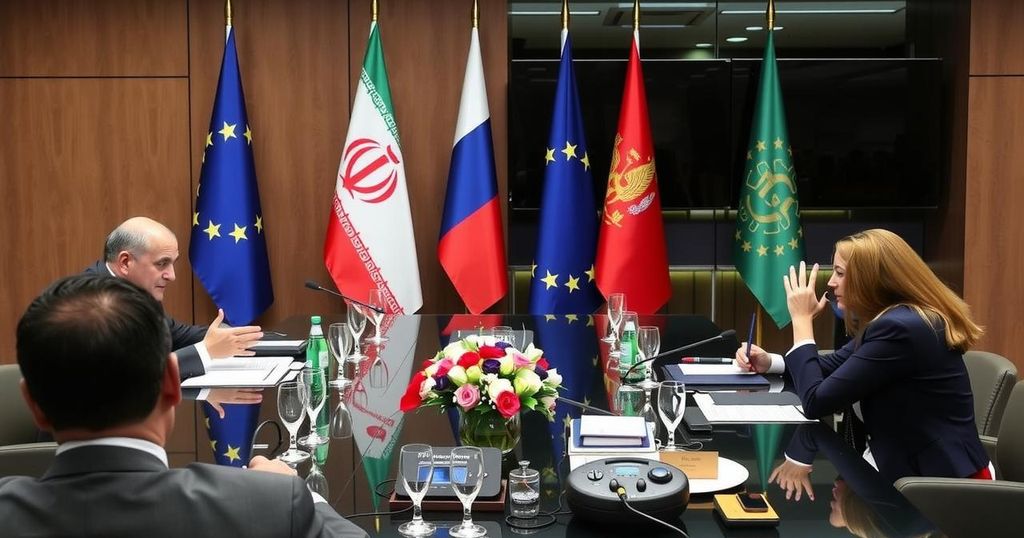Global news
ARMENIA, ASIA, BA, BAKYTZHAN SAGINTAYEV, BELARUS, COLOMBIA, COOPERATION, EE, EURASIAN ECONOMIC UNION, EUROPE, EUROPE/ASIA, FOREIGN MINISTRY, INTERNATIONAL RELATIONS, IRAN, KAZAKHSTAN, MAXIM RESHETNIKOV, MEHR, MEHR NEWS, MINISTER OF ECONOMIC DEVELOPMENT, MOHAMMAD ATABAK, PUTIN, RAISI, RUSSIA, SOUTH AMERICA, STRATEGIC PARTNERSHIP, TRADE
Marcus Li
0 Comments
Iran Achieves Observer Status in the Eurasian Economic Union
Iran has been granted observer status in the EEU during a meeting in St. Petersburg, aiming to enhance economic ties. The Iran-EEU Free Trade Agreement will eliminate tariffs on 87% of goods traded. The EEU hopes to foster cooperation, as evidenced by a significant increase in trade turnover from 2018 to 2023. Iran also seeks to strengthen ties with other countries like China, demonstrating its strategic economic interests.
Iran has gained observer status in the Eurasian Economic Union (EEU) during a recent Supreme Eurasian Economic Council meeting in St. Petersburg, Russia. The EEU aims to facilitate economic cooperation among its members—Russia, Kazakhstan, Belarus, Armenia, and Kyrgyzstan—and extends this opportunity to Iran to enhance its market ties. The Iran-EEU Free Trade Agreement is expected to eliminate tariffs on 87% of traded goods, while both parties will maintain a negative list of sensitive products, ensuring protection for key domestic industries.
The announcement, confirmed by Russian Economic Development Minister Maxim Reshetnikov, marks a significant development after the signing of the agreement by President Putin and the former Iranian administration last year. The EEU’s rapport with Iran has evolved over the years, reflected in a notable increase in mutual trade turnover, which surged from $2.7 billion in 2018 to approximately $5.2 billion in 2023. In the first ten months of 2024, trade has continued to flourish, with a year-on-year growth of 12.8% in mutual exchanges.
The increase in trade and Iran’s new observer status, alongside Uzbekistan and Cuba, reinforces the EEU’s commitment to analytical and economic integration. Bakytzhan Sagintayev, head of the Eurasian Economic Commission, anticipates that the agreement will soon catalyze economic interaction and foster favorable business conditions. This follows the early groundwork established in 2017 when discussions regarding preferential export tariffs began, leading to the recent comprehensive free trade negotiations.
Additionally, Iran is seeking to strengthen its economic ties with other nations, such as China, reflecting a strategic approach amid international sanctions. Notably, President Masoud Pezeshkian’s upcoming visit to Russia may culminate in signing a comprehensive cooperation agreement with Russia, building on previously drafted proposals.
The EEU’s expansion of observer status and its partnership with Iran signals a pivotal shift in regional economic dynamics, ultimately aimed at boosting trade and cooperation in a volatile global landscape.
The Eurasian Economic Union (EEU) is an economic union comprised of Russia, Kazakhstan, Belarus, Armenia, and Kyrgyzstan, established to foster economic collaboration and development among its members. Over the years, the EEU has sought to expand its influence by bringing in observer states, enhancing its economic framework. Iran’s admission as an observer state marks a significant milestone in this strategic partnership, aiming to tap into the Iranian market and vice versa amid fluctuating global economic conditions.
The recent conferment of observer status to Iran within the Eurasian Economic Union underscores a strategic alignment aimed at bolstering economic ties and trade relations. With a substantial reduction in tariffs anticipated through the Free Trade Agreement, both Iran and the EEU members stand to benefit significantly, while ongoing trade developments are poised to strengthen the regions’ economic frameworks amidst global challenges. The trajectory towards deeper cooperation is indicative of Iran’s proactive efforts to diversify its international partnerships and enhance its economic resilience.
Original Source: www.intellinews.com




Post Comment